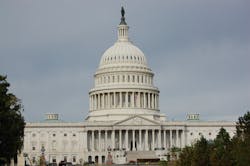A political battle is brewing over a rider attached to a federal government funding bill that would suspend the hotly-contested 34-hour rule added to hours of service (HOS) regulations in July last year.
Known as the “Collins Amendment” after its sponsor, Sen. Susan Collins (R-ME), the budget bill provision would suspend the restrictions imposed on drivers using the 34-hour restart – specifically that it requires two off-duty periods between 1 a.m. and 5 a.m. while limiting the use of the restart to once per week.
“In July 2013, with insufficient research, analysis and understanding of the consequences, the Obama administration placed two restrictions on America’s truck drivers that increased the risk of crashes on America’s highways,” noted Bill Graves, president and CEO of the American Trucking Associations, in a statement.
“Senator Collins, and a bipartisan majority of Senate appropriators, recognized the flaws in the changes put forth by the Federal Motor Carrier Safety Administration (FMCSA) and voted to approve a common sense ‘time out’ to allow for proper research to be conducted,” he added.
Graves referred to an earlier effort by Collins to suspend that provision this past summer when the Senate Appropriates Committee voted 21-9 to add a similar rider to a $54 billion funding measure for the Transportation Housing and Urban Development Department or “THUD,” which was later stripped out.
The current 34-hour restart suspension effort is drawing fire from Department of Transportation Secretary Anthony Foxx and advocacy groups such as Public Citizen.
“Basically, [the restart rule] requires that drivers have the opportunity to take a very real rest and catch up on sleep before working another very long week,” Foxx said in a statement. “The net effect of these changes was to reduce the average maximum week a driver could work from 82 hours to 70 hours.”
Foxx added he is “voicing my strong objection to this rider” as it will have the effect of once again allowing a segment of the trucking industry to operate an average of as many as 82 hours per week.
Joan Claybrook, president of Public Citizen and a former chief administration for FMCSA, took a much harsher tone in her statement concerning the restart rider.
“There has not been a single congressional oversight hearing in either the House or Senate on making this dangerous and deadly change to current law,” she said. “There has not been any comprehensive safety review and analysis by experts.”
Claybook also noted that there has not been an open rulemaking process for the public and others to express their views and voice their concerns about suspending the HOS 34-hour restart provision.
“Transparency is what is expected in a democracy when the public’s interests are put ahead of the interests of well-heeled and well-connected industry lobbyists,” she said.
The Owner-Operator Independent Drivers Association (OOIDA), however, believes that Congress should not remove the restart rider because it “forces truck drivers onto the highways during the most congested and dangerous hours of morning traffic,” and sent a letter to key senior members of the Senate and House appropriations committees asking them to support maintaining that restart suspension in the final fiscal year 2015 appropriations bill.
The group said that in a survey by the OOIDA Foundation completed last year, about 46% of respondents reported feeling more fatigued since the changes, with 65% noting that they’ve receives less income.
OOIDA’s report also indicated that the one 34-hour restart per week limitation caused 56% of the respondents to lose mileage and loads hauled per week.
“In comments, many respondents said they experience less time at home and increased stress,” the group said in its letter. “Indeed, the evidence of personal experience compels professional drivers to support removal of the restart restriction.”
About the Author
Sean Kilcarr
Editor in Chief
Sean Kilcarr is a former longtime FleetOwner senior editor who wrote for the publication from 2000 to 2018. He served as editor-in-chief from 2017 to 2018.
